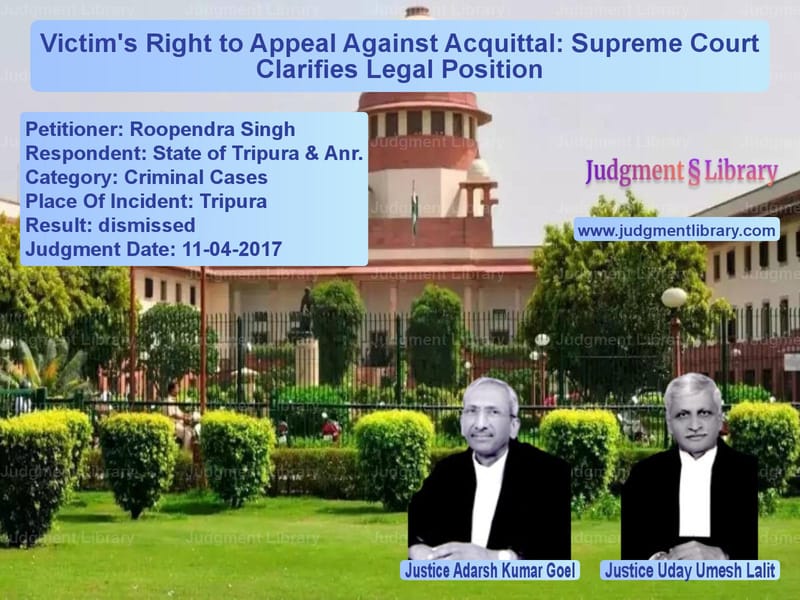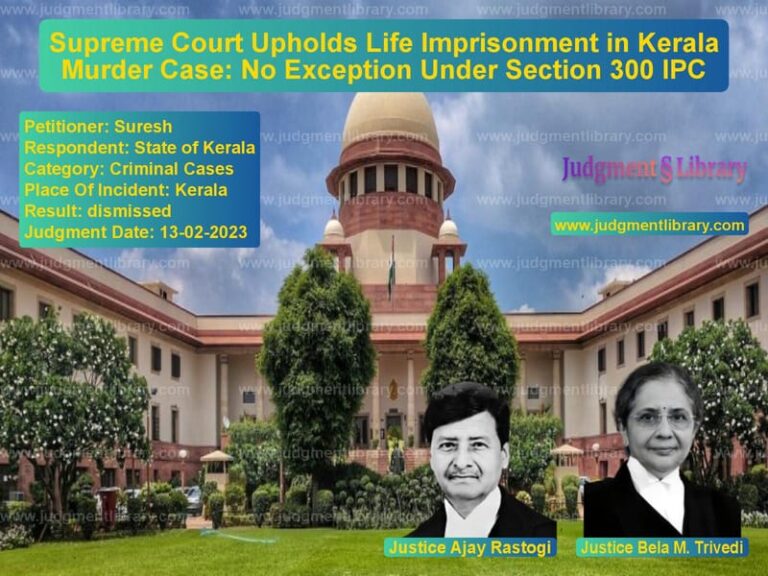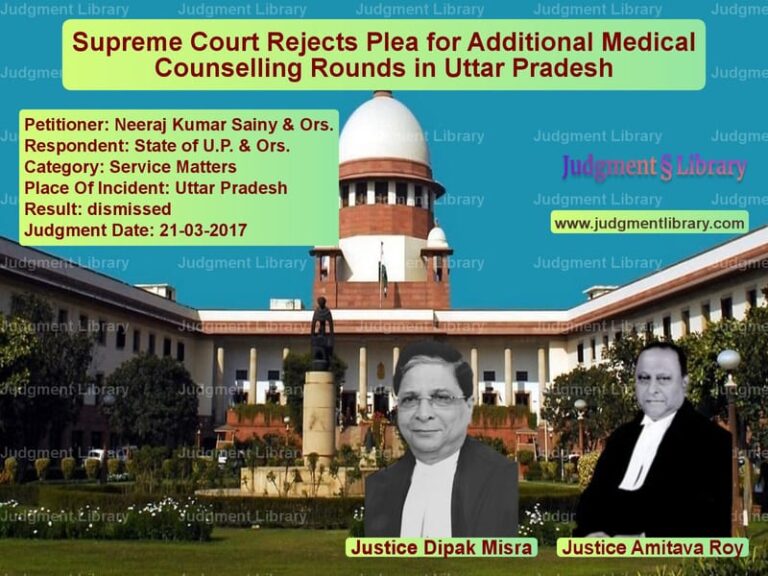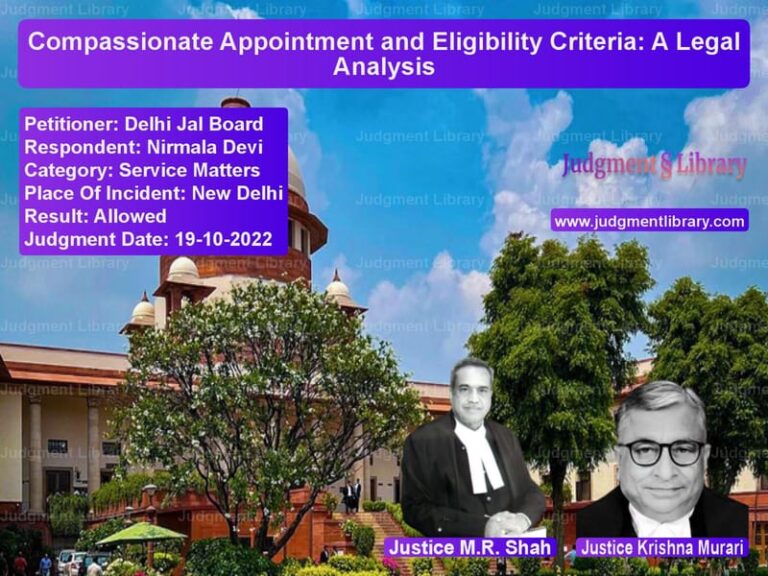Victim’s Right to Appeal Against Acquittal: Supreme Court Clarifies Legal Position
The case of Roopendra Singh vs. State of Tripura is a landmark judgment addressing the right of victims to appeal against acquittals under Section 372 of the CrPC. The Supreme Court was called upon to decide whether a victim’s appeal against acquittal requires leave under Section 378(3) CrPC, or if such an appeal is an independent right granted by the 2008 amendment to the Code of Criminal Procedure.
The case originated when Roopendra Singh was acquitted by the trial court of charges under Sections 342, 376(2)(b), and 506 IPC. The victim challenged the acquittal before the Gauhati High Court, which admitted the appeal without requiring leave. The accused challenged this decision before the Supreme Court, arguing that the victim’s right to appeal should be subject to the same conditions as the State’s appeal against acquittal. The Supreme Court examined the legislative intent behind the proviso to Section 372 CrPC and clarified the procedure for victims seeking to appeal acquittals.
Background of the Case
The appellant, Roopendra Singh, was tried in Sessions Trial No.22 (WT/K) 2010 before the Additional Sessions Judge, Khowai, West Tripura. He was charged with:
- Section 342 IPC (Wrongful Confinement)
- Section 376(2)(b) IPC (Aggravated Rape)
- Section 506 IPC (Criminal Intimidation)
On April 28, 2011, the trial court acquitted the accused of all charges. The victim filed an appeal under Section 372 CrPC before the Gauhati High Court, Agartala Bench, seeking to overturn the acquittal.
High Court Judgment
When the appeal was listed for admission, the accused raised an objection that under Section 378(4) CrPC, a victim cannot appeal an acquittal without first obtaining leave from the court. However, the High Court ruled that:
- The proviso to Section 372 grants victims an unrestricted right to appeal without requiring leave.
- The appeal is distinct from appeals filed by the State under Section 378(1) and 378(2).
- No procedural bar prevents a victim from appealing an acquittal.
Thus, the High Court proceeded with the victim’s appeal without requiring prior leave.
Supreme Court Judgment
The accused challenged the High Court’s decision before the Supreme Court, arguing that the High Court misinterpreted the law.
The Supreme Court, comprising Justices Adarsh Kumar Goel and Uday Umesh Lalit, examined the legal framework governing appeals against acquittals and ruled as follows:
- The right of a victim to appeal under the proviso to Section 372 CrPC is independent but not absolute.
- The main body of Section 372 states that no appeal shall lie except as provided in the CrPC.
- Section 378(3) mandates that an appeal against acquittal requires leave of the High Court.
- Thus, the proviso to Section 372 must be read in conjunction with Section 378(3), and a victim’s appeal also requires leave.
The Supreme Court ruled that the High Court’s decision was incorrect and that the victim must obtain leave before proceeding with an appeal against acquittal.
Key Excerpts from the Judgment
The Supreme Court emphasized:
“The proviso to Section 372 CrPC must be read along with the main provision and in conjunction with Section 378(3). Otherwise, it would render the requirement of leave under Section 378(3) redundant.”
On the nature of the victim’s right, the Court clarified:
“While the victim has a substantive right to appeal under the proviso to Section 372, this right is subject to procedural safeguards, including obtaining leave from the High Court.”
Legal Precedents Considered
- Satya Pal Singh vs. State of Madhya Pradesh (2015) – Holding that a victim’s appeal against acquittal must comply with Section 378(3) CrPC.
- Ram Phal vs. State (2015) – A Delhi High Court decision that was overruled by the Supreme Court for incorrectly holding that no leave was required.
- State of Punjab vs. Bhajan Singh (1975) – Reaffirming that procedural requirements in criminal appeals must be strictly followed.
Implications of the Judgment
- The ruling clarifies the procedural framework for victims seeking to appeal acquittals.
- It ensures that victims’ rights are recognized while maintaining judicial safeguards against frivolous appeals.
- The decision reinforces that the requirement for leave under Section 378(3) applies to all acquittal appeals, including those filed by victims.
- The judgment prevents misuse of the proviso to Section 372 by ensuring that appeals undergo judicial scrutiny before admission.
Conclusion
The Supreme Court’s ruling in Roopendra Singh vs. State of Tripura is a landmark decision that establishes the correct interpretation of the victim’s right to appeal an acquittal. By holding that such appeals require leave of the High Court, the judgment ensures a balanced approach that protects victims’ rights while preventing unregulated appeals. This decision provides essential clarity on the procedural aspects of criminal appeals in India.
Don’t miss out on the full details! Download the complete judgment in PDF format below and gain valuable insights instantly!
Download Judgment: Roopendra Singh vs State of Tripura & A Supreme Court of India Judgment Dated 11-04-2017.pdf
Direct Downlaod Judgment: Direct downlaod this Judgment
See all petitions in Bail and Anticipatory Bail
See all petitions in Criminal Conspiracy
See all petitions in Custodial Deaths and Police Misconduct
See all petitions in Judgment by Adarsh Kumar Goel
See all petitions in Judgment by Uday Umesh Lalit
See all petitions in dismissed
See all petitions in supreme court of India judgments April 2017
See all petitions in 2017 judgments
See all posts in Criminal Cases Category
See all allowed petitions in Criminal Cases Category
See all Dismissed petitions in Criminal Cases Category
See all partially allowed petitions in Criminal Cases Category







